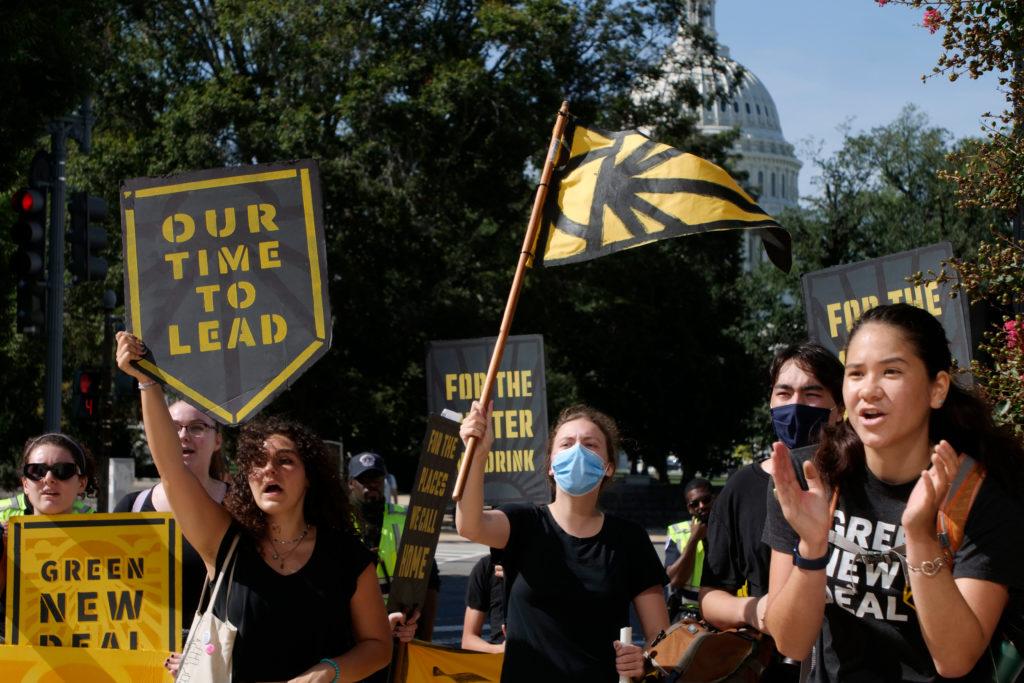Sunrise GW launched a campaign pressing officials to enact a ban on funding from a line of the country’s largest fossil fuel companies Tuesday.
The “No Fossil Fuel Money Campaign” initiative pressures officials to reject funding from fossil fuel companies that have worked to oppose climate action, including ExxonMobil and Chevron, and “end reliance” on fossil fuel funding from the top 200 public owners of oil, coal and gas reserves. Student leaders said more than 200 students have signed a petition in support of the campaign, which was outlined in a letter members sent to administrators and the Board of Trustees in an effort to highlight “the stakes of climate crisis.”
Sunrise members said they’re requesting officials to meet the campaign’s demands by the end of the semester Dec. 22.
“As students deeply concerned about the climate crisis and committed to our University, we are calling on you to take the next steps towards building a better future for all of us,” the letter sent to the administration and the board states.
The release states officials must start turning away funding from the “Slippery Six,” a group of six fossil fuel companies that testified before Congress about their role in an alleged “long-running, industry-wide campaign” to spread disinformation about how fossil fuels can cause global warming. The group is comprised of ExxonMobil, Chevron, BP America, Shell, the American Petroleum Institute and the U.S. Chamber of Commerce.
Sunrise also called on the University to ban funding the top ten funders of a countermovement against the climate change intended to obstruct climate action.
The campaign requests officials to adopt a plan to end reliance on funding from the Carbon Underground 200, the top executives of publicly-owned oil, gas and coal reserves across the globe. The list of 200 owners are ranked by the amount of carbon emissions embedded in their reserves.
Sunrise has protested GW’s ties to fossil fuel companies for years, advocating for the closure of the Regular Studies Center and demanding divestment from the fossil fuel industry – a commitment that GW eventually made last June.
“We divested from fossil fuels to align our investments with our commitment to climate action,” the letter states. “Now, in order to lead on climate in higher education, GW must examine how the fossil fuel industry’s investments in our university square with those same commitments.”
The release states other universities, like the University of Texas, have banned funds from companies like those in the tobacco industry, which tamper with research and mislead the public.
“By taking the steps we called for today, GW can address issues deeper than any one center,” the letter states. “It is time to be a model across higher education for how to best position institutions to take on the greatest challenge of our time.”
Sunrise also called on faculty, institutions, students and student organizations at GW to become a “climate ally” or “climate leader” and pledge their support for the campaign, according to Sunrise’s petition.
Aza Evans-Townsend – one of three chairs on the Sunrise’s Regulatory Studies Center committee, which spearheaded the launch of the new campaign – said if the University does not respond to the group’s requests by the December deadline, members will initiate meetings with administrators, organize protests and hold events with students to continue pushing for their demands.
“It is something that’s so important to us, and we know that the community cares about it,” she said. “We have plans if we are completely ignored to continue pushing, to have our voices heard.”
She said members hope officials will stop accepting money from fossil fuel companies to research centers, so GW can continue to set the precedent to combat climate change among universities nationally.
“Sunrise GW had a big win with divestment, and a lot of top universities around the country are deciding to divest,” she said. “And that’s a big step in ensuring that fossil fuel money isn’t getting more influence from our universities, but the reason we’re launching this campaign is because there’s still influence from big oil and the fossil fuel industry that is infiltrating our campuses.”








